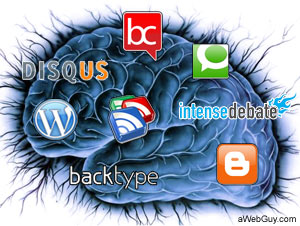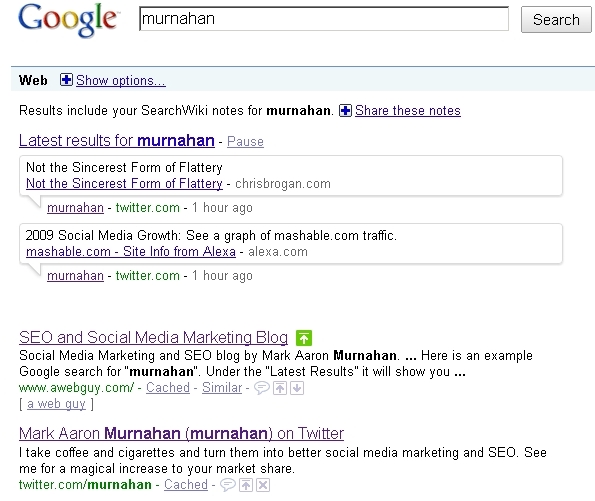
It may sound obvious to you that blogging improves intelligence. After all, if you are using your brain more, it will get stronger. What is not so obvious are the many ways it can make you smarter. Blogging can increase your business intelligence, expand your creativity, provide you with a better perspective on the intelligence around you, and more. Much relies on how you use it, and I am here to help you get smarter, so stop scanning and start reading!
Blog Reading and Commenting is Blogging Too!
When I say blogging, I do not just mean sitting down at your computer to face the arduous task of writing something enlightening for a bunch of imaginary readers each day. I do not mean chugging coffee from early morning until the sun revolves around the earth another time. I do not mean the kind of brain exercise that burns you out after a week, or the huge expenditure of time that full-time writers invest. Get that out of your brain right now, because I want to put some more useful thoughts in there.
When you use blogging the way I will describe it here to boost your intelligence, you will have more creativity to share. Creativity and knowledge are not finite resources. When you use them more, you have more to use.
Community Intelligence Benefits of Blogging
Maybe you have heard the term “blogging community”, but do you really see it as a community? If you do not see blogging as a community, you may not be approaching it right. There are a lot of little blogging communities, and they make up the “blogging world”. There are many great connections to make in that blogging world, and it is best to recognize this fact.
Where are these blogging communities? There are established blogging communities, and then there are less formal blogging communities of people who just seem to read the same blogs and get to know each other with blog commenting and expanding on topics in conversations. Examples of established formal blogging communities include Blog Catalog and Technorati. These communities also stretch into the deepest reaches of that long list of social networks that I have placed on the left side of my blog.
Less Formal Blogging Communities
I am far more engaged in the less formal blogging communities which I have come to know by responding to authors and other blog commenters. Even if I do not communicate with them each day, week, or even month, these are people that have become familiar to me and people with whom I have become familiar. It is a loose community of bloggers that I have come to know and enjoy. Some, but not all of them have their own blogs. When I get to know them by reading and responding to their comments on a blog, I often come to read their blog and find out more of their opinions. The same thing works in reverse, too. If people are interested in what you have to say, they will often want to know a bit more about you.
Notice that most blogs have a place to include your website address when you add a comment, thus creating a link to you show who you are. If you are making useful contributions and provide good input on a topic in the blog’s comments, people use those links! It is a fantastic way to meet others and build relationships, whether for personal or business purposes. It is also an extremely useful way for people to come to know you!
I have found that when I blindly venture out to find new blogs, I discover a lot more horrible writing than I find intelligence. Conversely, when I look to my communities, I find people with viewpoints and writing that interests me and stimulates my thoughts.
As you discover and step into a community of blogging, you can grow your confidence with a greater sense of security that what you are reading will benefit you. These are the blogs where you will learn at the best pace, because they make you think about something of interest to you. When you are stimulated by the content, the rest starts to come much easier.
Are you feeling smarter yet? Keep reading and get those brain cells pumping some iron. I will get to the proof that it makes you more intelligent, be patient.
Blogging Doesn’t Just Mean Writing Blog Posts
It should be obvious by now that a person does not have to master a language to be a blog writer. It offers a very low barrier of entry for writing, so there are a lot of novice writers. They are still learning, and with a lot of dedication they may get really good at it. Jumping into writing frequent blog posts can be intimidating, time consuming, and it can hold some hard lessons. There must be an easier way for non-writers to improve their skills and get their brains in shape for producing better content.
Most people are not born as great writers. In fact, many people with advanced college degrees are still terrible writers. It seems that many people dread writing, so it should be no surprise that they never became good at it. It horrifies some people to imagine coming up with something to write about and then putting it into a proper structure for public consumption. Do not worry about it … blogging does not mean you have to do a lot of writing! However, it is best to do some writing in order to receive the best benefits and expand your talents.
Reading and commenting on blogs is often a great way to find out just how right or wrong your thinking is before you apply it to your own brilliant literary works. I should note that I spend a lot more time reading and commenting on other blogs than I spend writing my own blogs. It makes me stronger as a writer and it gets the hamsters in my brain jumping.
Very Few Bloggers Are Brilliant 100 Percent of the Time!
Don’t worry; you do not always have to be brilliant. I think it is a huge fear for a lot of people that if they don’t have something brilliant to say that they don’t say anything. Fortunately for you, there is a burning desire to become more intelligent. This brings me to the point about proving that blogging makes a person more intelligent.
Maybe I stimulated your thoughts on how to engage in blogging as a community, or how discovering thought provoking friends can be a benefit. In any event, you read this and you are now aware of another viewpoint … my viewpoint. With that viewpoint and the others expressed in the comments to this article, you will have just a little more understanding of the world around you and how people think.
Most importantly, you can surely see the enormous benefits to using blogging as a communications tool, and how two-way communications can be far more beneficial to learning than only one. Now if you want the best proof of how blogging improves intelligence, add your comments and learn about other reader’s viewpoints. That is where the real proof comes in. Just watch what happens when all of my brilliant readers get to communicating!
Related articles:
